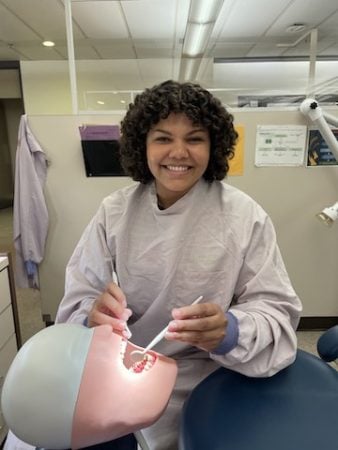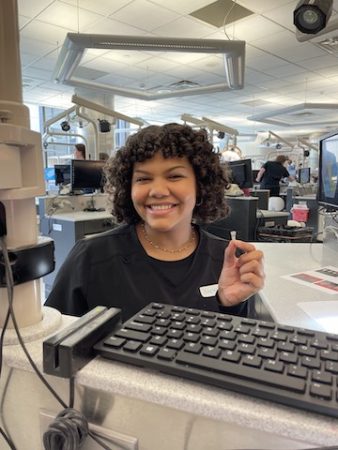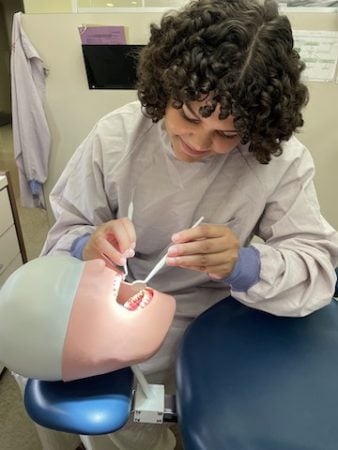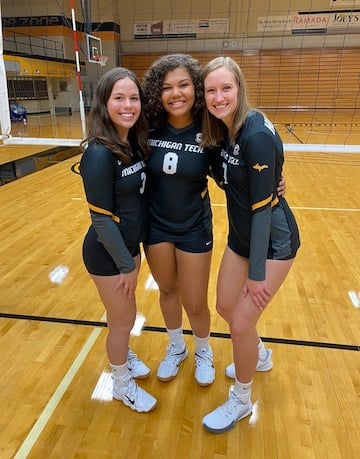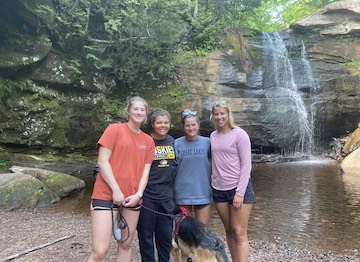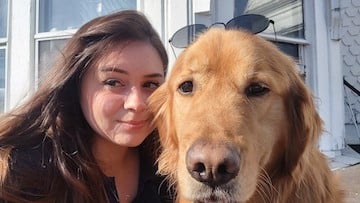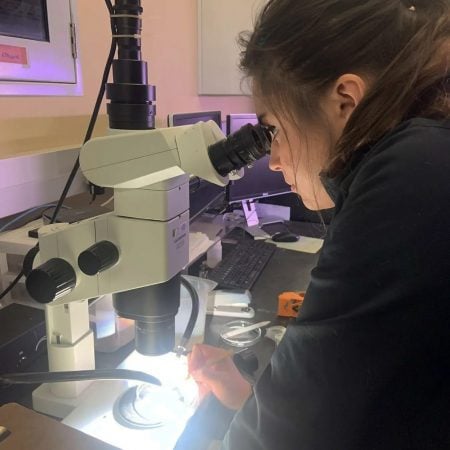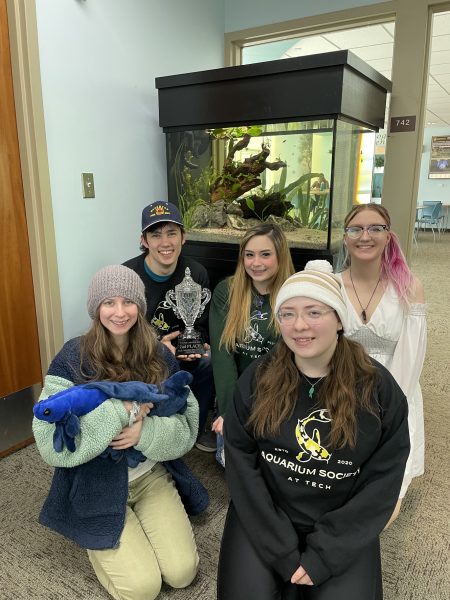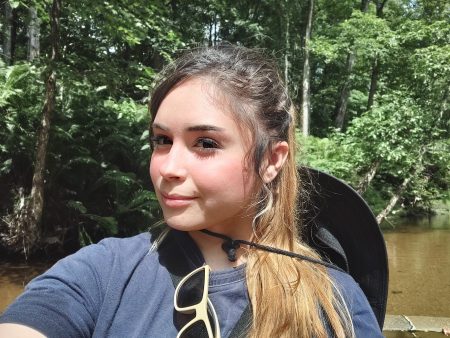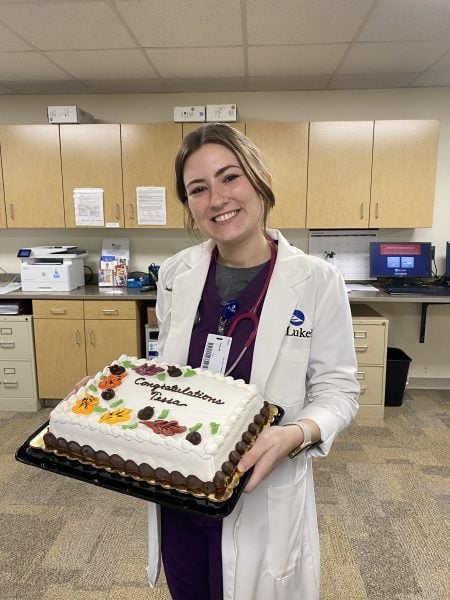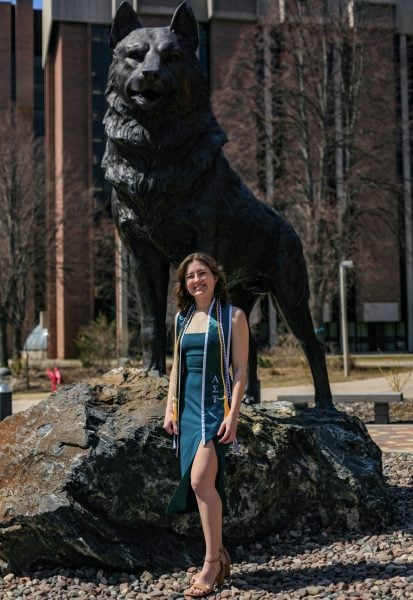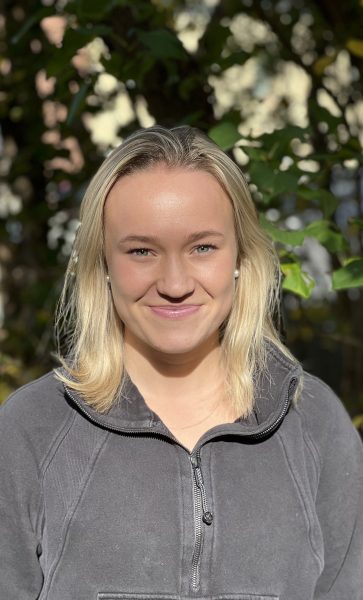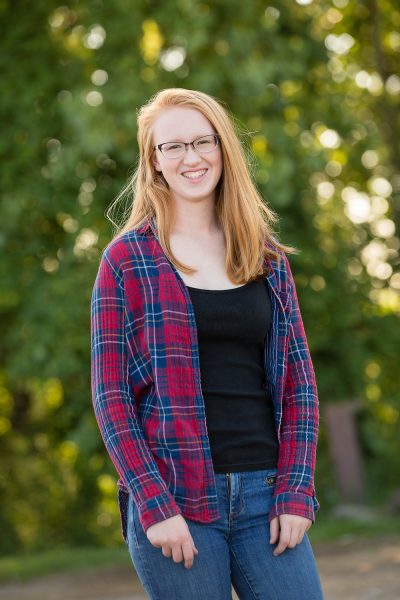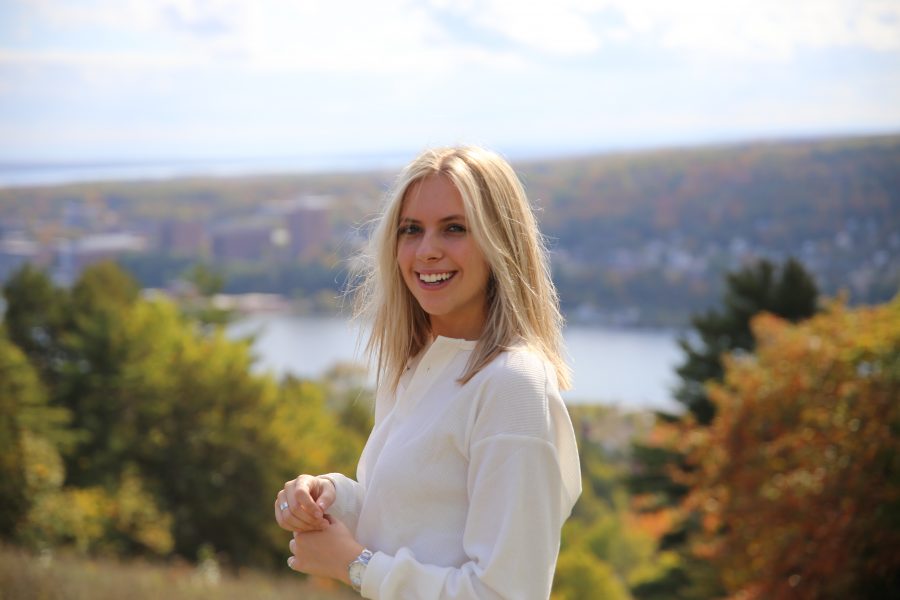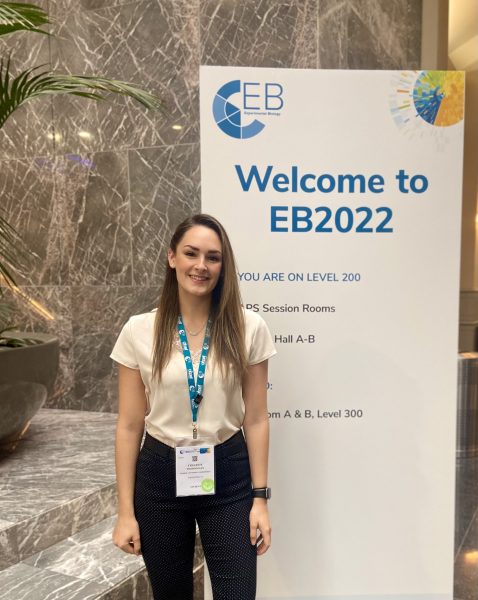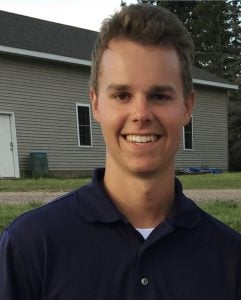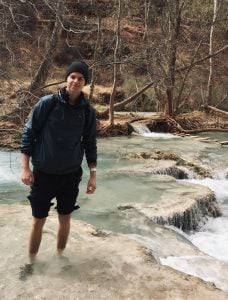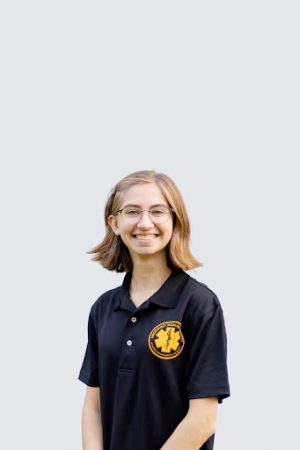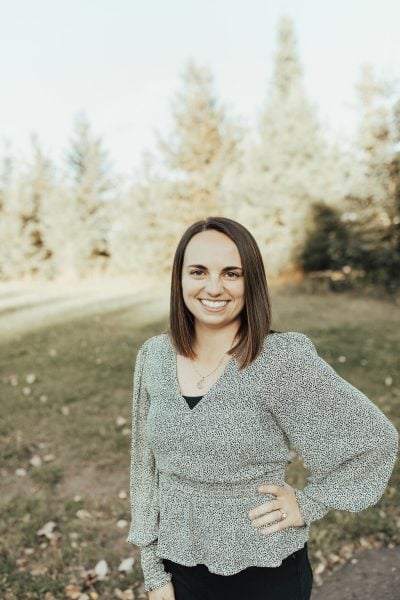
Dr. Amanda (Crane) Deyaert, DC, CACCP, knew she wanted to become a chiropractor when she was just a teenager. At the age of 14, she was a dedicated athlete participating in basketball, volleyball, figure-skating, and track when she first started receiving adjustments for various sports injuries. Over the next few years, she was treated by local chiropractors Dr. David Hill, Dr. Kemmy Taylor, and Dr. Mischa Doman. It was then her interest in kinesiology—the study of movement—was born.
A Chiropractor’s Academic Journey
After high school graduation, Dr. Amanda (as she likes to be called) started her BS in Exercise Science at Michigan Tech. As one of the most common undergraduate majors chosen by pre-health students, she said the degree made sense with its focus on kinesiology and integrated physiology. Supporting her continued fascination with body movement, the Motor Development and Biomechanics of Human Movement courses were her favorites. And because an exercise science degree could also prepare students for careers in physical therapy, athletic training, occupational therapy, respiratory therapy, etc., Dr. Amanda said she chose it to keep her options open just in case her interests changed during her undergraduate studies. They didn’t.
After graduating from Tech, Dr. Amanda attended Northwestern Health Sciences University in Minnesota and received her Doctorate of Chiropractic in 2016. She said her coursework at Tech adequately prepared her for her graduate school experience, and that “the combination of lecture and laboratory classes in anatomy and physiology, and other pre-health subjects gave [her] a solid foundation to build upon in the chiropractic program.” However, in addition to preparatory coursework, Dr. Amanda also recommended shadowing local health professionals to get a greater sense of the profession. She herself had this opportunity when she shadowed Dr. Kemmy (who is also MTU’s Pre-Health Programs Director) and Dr. Mischa of Superior Family Chiropractic almost 15 years ago as an MTU student. The ultimate result? An invitation to join the practice almost a decade later.
Clinical Practice and Specialized Training for Chiropractors
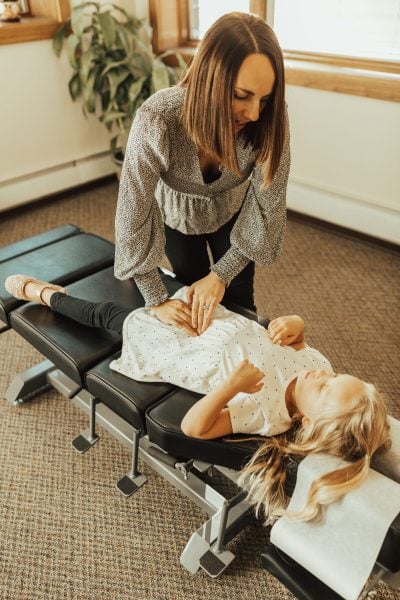
But first Dr. Amanda had to leave her beloved hometown of Chassell. She studied and worked in Minnesota for many years, garnering the most important perspectives and experiences a big city offers: diversity and specialization. Dr. Amanda practiced in Shakopee, MN, for almost four years and had clinical rotations with the Salvation Army Harbor Light Center (a healthcare program at the homeless shelter in downtown Minneapolis) and the Pillsbury House Integrated Health Clinic: a student-run, free holistic healthcare clinic. She brought this training back to the UP.
These experiences in the Twin Cities widened her eyes to the challenges of living in a small town. For example, access to specialty care can be very difficult in remote towns and rural areas. Between the length of time for referrals and great travel distances, many patients are frustrated. She finds it very meaningful to be able to provide a specialized service to her community.
Chiropractic Care From Pregnancy To Pediatrics
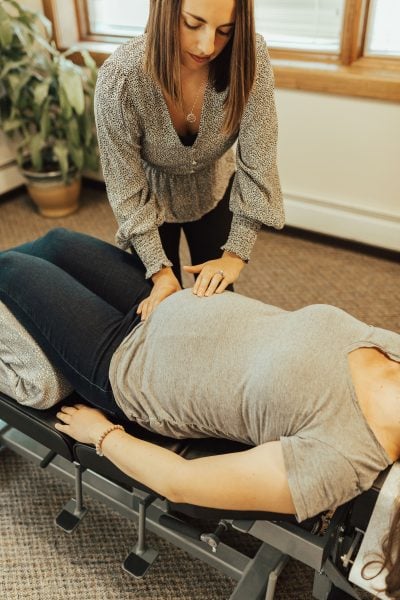
And the services she offers in chiropractic health are specialized. She is one of the few pediatric and prenatal chiropractors offering services in the UP right now, and she said the local response has been overwhelming as many people are looking for natural healthcare. Dr. Amanda is certified in the Webster Technique for Pregnancy and CACCP, a pediatric certification through the International Chiropractic Pediatric Association (ICPA). As both a practitioner and the mother of two young daughters, she says the benefits of pediatric, prenatal, and postpartum chiropractic care are undeniable. As children grow fast, they might experience injuries or pain during a growth spurt. Using a variety of low-force adjustment techniques can remove nerve irritation as a child grows.
Pediatric chiropractic care has also been proven to encourage brain and nerve development, assist with colic and reflux, and help with constipation and bedwetting issues, among many other benefits. And as women’s bodies also change quickly during and after pregnancy, chiropractic care can help with optimal pelvic alignment, decreased back pain, and more comfort while breastfeeding. Dr. Amanda is proud to have fostered strong relationships with local midwives and pediatricians who encourage these types of treatments and adjustments.
Serving the Specific Needs of a Local Community
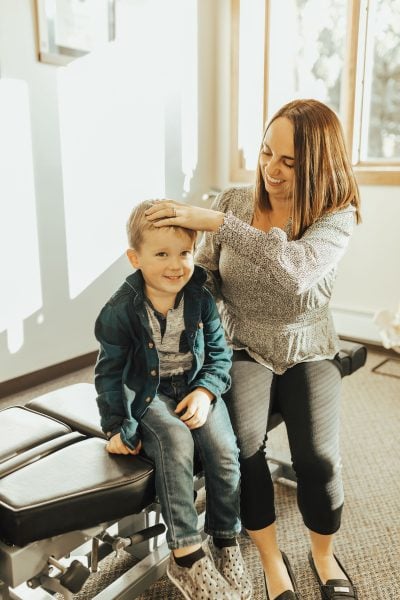
Dr. Amanda and Dr. Mischa have also developed strong relationships with the Veterans Administration (VA) community. Since they are both in network with the VA, many veterans now have access to chiropractic services. As a chiropractor, Dr. Amanda’s highest belief is that chiropractic care such as alignment and adjustments are helping your body function better, as well as improve the effects of physical and emotional stress. “Chiropractic care is about so much more than just spinal misalignments,” she says. “When adjusting the spine, we are affecting the nervous system, which controls everything in the body. By removing irritation, we are allowing the body to heal the way it was designed to, without any interference, or the need for drugs or invasive procedures.” She wants her patients to feel well, naturally.
Dr. Amanda says she is “here for what [her] patients need.” If patients are seeking general wellness, she might see them on a monthly or quarterly basis. Or she might see small children with the most common ear infection or digestive problem. Whatever the issue, Dr. Amanda compares chiropractic care to untangling a kink in a water hose. Something is not flowing correctly in the spine and nervous system. Chiropractic adjustments help to clear this block. And with three chiropractors in the Superior Family Chiropractic practice in Chassell, MI, Dr. Amanda, Dr. Kemmy, and Dr. Mischa are all here to help.
Chiropractic Care for Chassell Offers Meaning
And being able to help people in her hometown has probably been the most meaningful aspect of her job. After starting her family in Minnesota with her husband, a Michigan Tech civil engineering alum, the couple decided it was time to come home. Leaving the Houghton area after graduation wasn’t easy since Dr. Amanda has deep roots in this community. Her family owns the Crane Berry Farm, and they have been integral to both personal and professional relationships in the area for decades.
Staying Local for College
But when asked what the benefits of staying local for college were, she didn’t hesitate to respond. “Local students have such an amazing opportunity for a high-quality education right in our own hometown! The size of the campus at Michigan Tech [is] also a benefit because [you don’t] feel like a number. I felt seen and heard as an individual student.” Dr. Amanda also recommends living on campus–versus commuting from home—if possible. It’s a great way to become immersed in the college atmosphere, even if you’re still close to home. Dr. Amanda fondly remembers her Tech experience and looks forward to mentoring students in the future–making them feel just as seen and heard as she did.
Advice for Aspiring Chiropractors (and Other Medical Professionals)
Looking back on her college career, Dr. Amanda did say she would do a few things differently. Most pre-health students don’t realize they will most likely own their own business or practice one day. Because of this, she strongly suggests taking electives in business classes such as marketing and accounting. She credits Michigan Tech’s Small Business Development Center (SBDC) for helping her set up her LLC and Tax ID #. The SBDC is available to Tech students, alumni, and the local community.
And owning her own business, she says, has “afforded her the flexibility to work in a career she loves, while still being able to spend as much time as possible with family.” Returning home has facilitated a beautiful work-life balance for her entire family, and she credits her time at Michigan Tech for fostering many of the experiences and relationships necessary for her rewarding career in chiropractic care.
About the Michigan Tech pre-health program
The Michigan Tech pre-health program is an excellent entree to a rewarding career in health. We prepare you for graduate health programs like medical school, dental school, pharmacy school, and many other allied healthcare professional programs. You receive help navigating the application process and obtaining experiential learning opportunities, like clinical experience. You obtain the prerequisite courses you need in order to apply. All of this has led to a 70% acceptance rate into all graduate health programs for Tech graduates (nearly twice the national average). Learn more about the student experience on the Pre-Health Blog.
